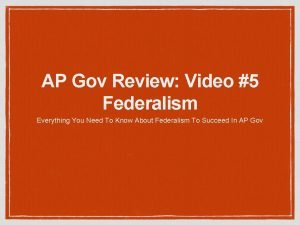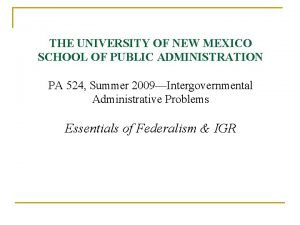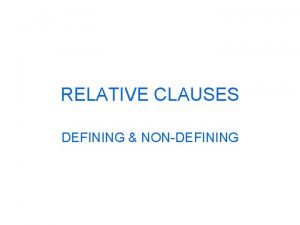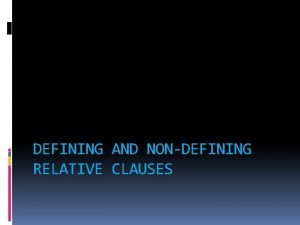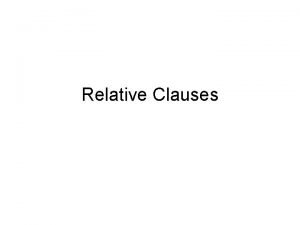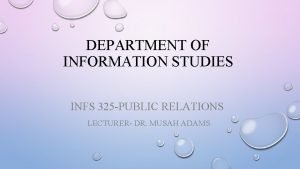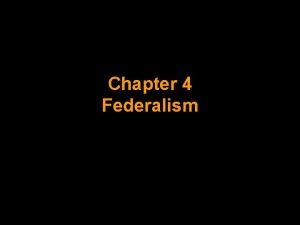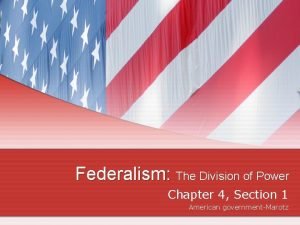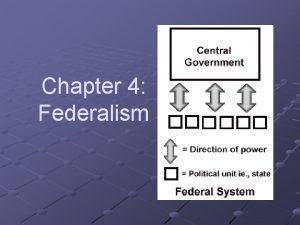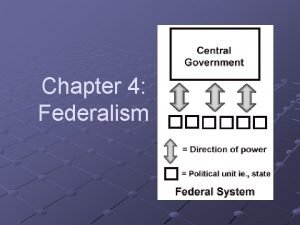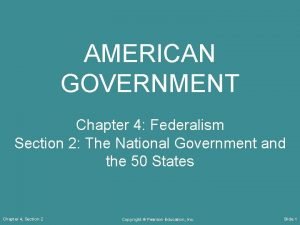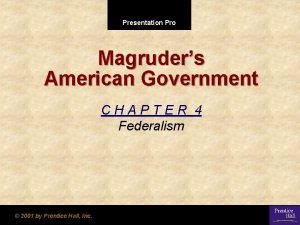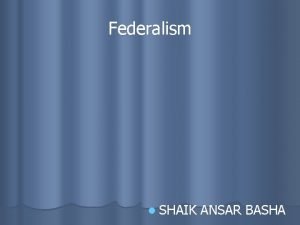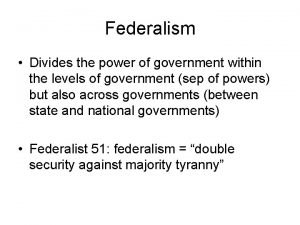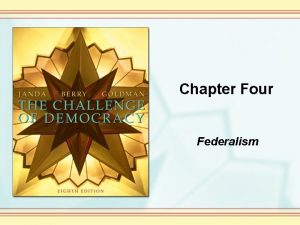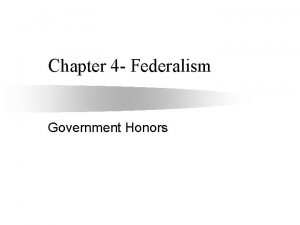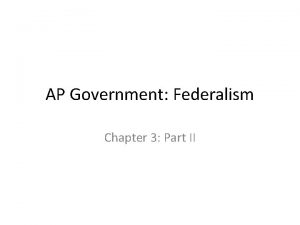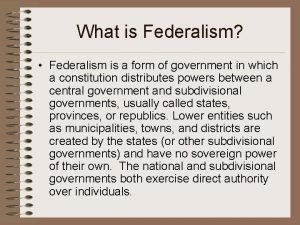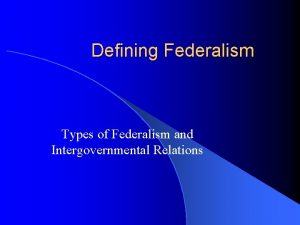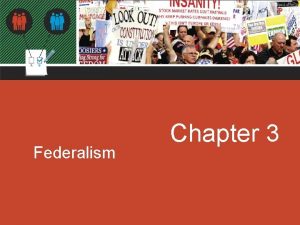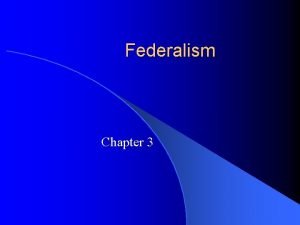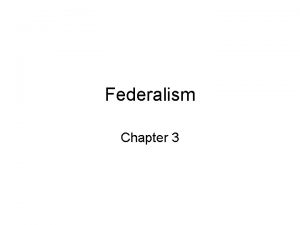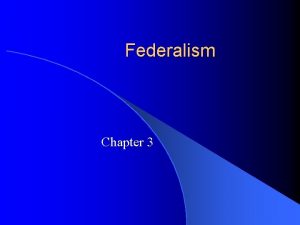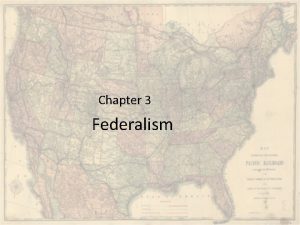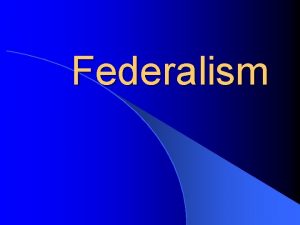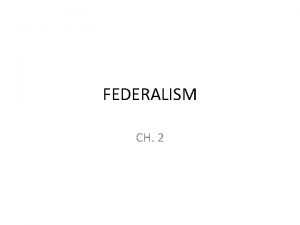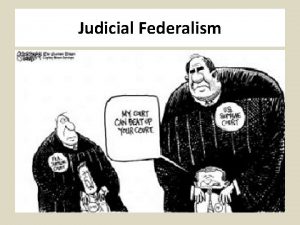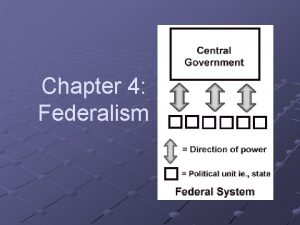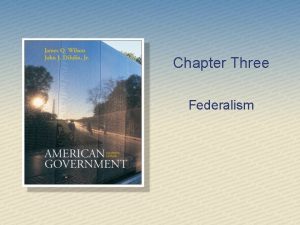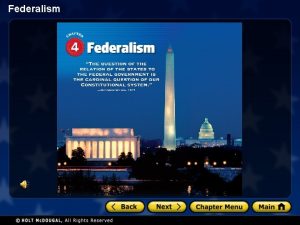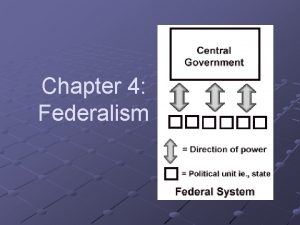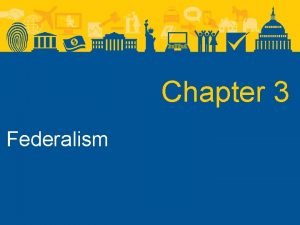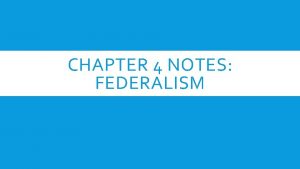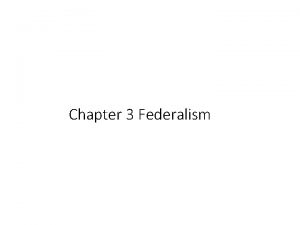Federalism Chapter 3 Defining Federalism Intergovernmental Relations the









































































- Slides: 73

Federalism Chapter 3

Defining Federalism Intergovernmental Relations: the workings of the federal system- the entire set of interactions among national, state and local governments What is Federalism? Federalism: a way of organizing a nation so that two or more levels of government have formal authority over the land people Other ways of organizing a nation Unitary governments: a way of organizing a nation so that all power resides in the central government Confederation: The United Nations is a modern example.

Defining Federalism

FEDERAL Unlike in or Our Constitution gave power to both the central government and states. the two levels SHARE power.

Federalism

Countries with Federalism

Unitary Governments

Confederation

Defining Federalism Why Is Federalism So Important? Decentralizes our politics ▪ More opportunities to participate Decentralizes our policies ▪ Federal and state governments handle different problems. ▪ States regulate drinking ages, marriage, and speed limits. ▪ States can solve the same problem in different ways and tend to be policy innovators.

Defining Federalism • Coin money • Conduct foreign relations • Declare and conduct war • Post office • Provide army and navy • Regulate commerce among states and other nations • Establish courts inferior to Supreme Court • Makes laws necessary to carry out the above

Defining Federalism • Ratify amendments to US Constitution • Public health, safety and morals. • Conduct elections • Establish local government • Regulate commerce within a state

Defining Federalism Federal Powers State Powers • Supremacy • Tenth Amendment Clause Concurrent • Reserved • Delegated Powers • Enumerated Shared • Elastic • Implied

Federalism: Marijuana

Federalism: Penalties for texting while driving.

Federalism: Seat Belt Enforcement

Federalism: Voter ID

Federalism: Corporal Punishment

Federalism: State Welfare Benefits

More Federalism Constitutional Amendments Voting and elections Congressional district boundaries Electoral College Senatorial Courtesy for Judges

The Constitutional Basis of Federalism The Division of Power Supremacy Clause, Article VI of the Constitution states the following are supreme: ▪ The U. S. Constitution ▪ Laws of Congress ▪ Treaties The Elastic Clause Yet, national government cannot usurp state powers. ▪ Tenth Amendment

The Constitutional Basis of Federalism The Division of Power Supremacy Clause, Article VI of the Constitution states the following are supreme: ▪ The U. S. Constitution ▪ Laws of Congress ▪ Treaties The Elastic Clause Yet, national government cannot usurp state powers. ▪ Tenth Amendment

The Constitutional Basis of Federalism The Division of Power Supremacy Clause, Article VI of the Constitution states the following are supreme: ▪ The U. S. Constitution ▪ Laws of Congress ▪ Treaties Yet, national government cannot usurp state powers. ▪ Tenth Amendment

Expanding Federal Power Establishing National Supremacy

Expanding Federal Power Establishing National Supremacy 1. Implied and enumerated powers: The elastic clause 2. Commerce Powers ▪ Gibbons v. Ogden (1824) 3. The Civil War (1861 -1865) 4. The Struggle for Racial Equality ▪ Brown v. Board of Education (1954)

Mc. Culloch v. Maryland 1819 Congress has implied powers because of the “necessary and proper clause” which is also called the elastic clause.

Expanding Federal Power Establishing National Supremacy 1. Implied and enumerated powers the elastic clause 2. Commerce Clause 3. The Civil War (1861 -1865) 4. The Struggle for Racial Equality ▪ Brown v. Board of Education (1954) and

Gibbons v. Ogden 1824 Congress has the right to regulate interstate commerce.

NY NJ Gibbons Federal License Ogden State License

Gibbons v. Ogden (1824) AKA ‘The Steamboat Case’ Congress has exclusive power to regulate INTERSTATE commerce. + asdfdbroadly defined commerce. Steamboats GO

Commerce Clause = Loophole Interstate Commerce (one of Congress’ delegated powers) t They can get through the 10 th Amendment Shield 10 th Amend. Shield “powers not delegated to the United States by the Constitution, nor prohibited by it to the States, are reserved to the States”

Commerce Clause & Roscoe Filburn Can the federal government control how much a farmer grows because it could affect Interstate Commerce? ?

The Commerce Clause gave the Civil Rights Act of 1964 its “teeth”

Commerce & Marijuana In Gonzales v. Raich (2005) the court ruled 6 -3 that the Feds could overrule state laws permitting marijuana because of commerce. “It is not the job of the court to decide whether or not Congress made a good law by ruling medicinal marijuana illegal but to decide whether or not they acted within their powers. For a national commodity, such as marijuana, and the Congress’ ability to regulate interstate commerce, they certainly acted appropriately. ” – John Paul Stevens

Alfonso Lopez v. US (1995) Gun Free School Zones Act (1990) ■ It shall be unlawful for any individual knowingly to possess a firearm…. [in] a school zone. ■ Whoever violates [this law] shall be fined not more than $5, 000, imprisoned for not more than 5 years, or both. A case about guns that really isn’t about guns at all. . .

Alfonso Lopez (12 th grade) brings gun to school in March of 1992. Elastic or “Necessary & Proper” Clause Lopez charged with FEDERAL Gun Free School Zones law. + Interstate Commerce Clause In FEDERAL court, Lopez’ attorneys ask what gives Congress the power to regulate guns in school? The federal prosecutor says, “commerce. ” = Gun Free School Zone Act (1990)

Supreme Court rules (5 -4) that the Gun Free School Zone Act was unconstitutional Lopez was “off the hook” for bringing a gun to school. . . but it took years of his life. (3/92 -4/95) Federal Appeals Court Lopez conviction reversed The SCOTUS did NOT say that Lopez didn’t do anything wrong. He did. However, you can’t punish somebody for breaking a law that is unconstitutional. Federal District Court - Lopez Convicted Congress re-wrote the Gun Free School Zone Act with a better commerce “hook” If Congress keeps “stretching” the Interstate Commerce Clause too far, SCOTUS will snip it and rule the law unconstitutional.

Expanding Federal Power Establishing National Supremacy 1. Implied and enumerated powers the elastic clause 2. Commerce Powers 3. The Civil War (1861 -1865) The Struggle for Racial Equality ▪ Brown v. Board of Education (1954) and

The Civil War

Expanding Federal Power Establishing National Supremacy 1. Implied and enumerated powers 2. 3. 4. 5. the elastic clause Commerce Powers The Civil War (1861 -1865) Constitutional Amendments The Struggle for Racial Equality ▪ Brown v. Board of Education (1954) and

Constitutional Amendments 14 th Amendment: Due process and Equal Protection 15 th Amendment: Voting expansion 16 th Amendment: Income tax 17 th Amendment: Direct election of senators

Expanding Federal Power Establishing National Supremacy 1. Implied and enumerated powers 2. 3. 4. 5. the elastic clause Commerce Powers The Civil War (1861 -1865) Constitutional Amendments The Struggle for Racial Equality and

Expanding Federal Power Establishing National Supremacy 1. Implied and enumerated powers 2. 3. 4. 5. 6. the elastic clause Commerce Powers The Civil War (1861 -1865) Constitutional Amendments The Struggle for Racial Equality The New Deal and

The New Deal

Federalism: State to State

Federalism: State to States’ Obligations to Each Other Full Faith and Credit: Each state must recognize official documents and judgments rendered by other states. ▪ Article IV, Section I of Constitution Privileges and Immunities: Citizens of each state have privileges of citizens of other states. ▪ Article IV, Section 2 of Constitution Extradition: States must return a person charged with a crime in another state to that state for punishment.

Types of Federalism Dual Federalism Definition: a system of government in which both the states and the national government remain supreme within their own spheres, each responsible for some policies Like a layer cake

Types of Federalism Cooperative Federalism Definition: a system of government in which powers and policy assignments are shared between states and the national government Like a marble cake Shared costs, shared administration, federal guidelines.

Dual Federalism vs. Cooperative Federalism Dual Federalism Cooperative Federalism

Types of Federalism COOPERATIVE FEDERALISM Broad interpretation of the “necessary and proper” clause Emphasize Supremacy Clause Tend to be liberals DUAL FEDERALISM Narrow interpretation of the “necessary and proper” clause Emphasize the 10 th Amendment and states’ rights Tend to be conservatives

Cooperative Federalism: Highways

Cooperative Federalism: Mass Transit

Cooperative Federalism: Education

Federalism Today

Federalism Today Fiscal Federalism the pattern of spending, taxing, and providing grants in the federal system cornerstone of the national government’s relations with state and local governments Function of Federal Grants

FISCAL FEDERALISM Using $$$ to get the states to do things the central government views as a priority.

Devolution

Devolution Returning power to the states

Federalism Today Fiscal Federalism The Grant System: Distributing the Federal Pie ▪ Categorical Grants: federal grants that can be used for specific purposes; grants with strings attached ▪ Project Grants: based on merit ▪ Formula Grants: amount varies based on formulas ▪ Block Grants: federal grants given more or less automatically to support broad programs ▪ Grants are given to states & local governments.

Federalism Today Fiscal Federalism The Grant System: Distributing the Federal Pie ▪ Categorical Grants: federal grants that can be used for specific purposes; grants with strings attached ▪ Project Grants: based on merit ▪ Formula Grants: amount varies based on formulas ▪ Block Grants: federal grants given more or less automatically to support broad programs ▪ Grants are given to states & local governments.

Categorical Grants: Money with strings

Federalism Today Fiscal Federalism The Grant System: Distributing the Federal Pie ▪ Categorical Grants: federal grants that can be used for specific purposes; grants with strings attached ▪ Project Grants: based on merit ▪ Formula Grants: amount varies based on formulas ▪ Block Grants: federal grants given more or less automatically to support broad programs ▪ Grants are given to states & local governments.

Types of Categorical Grants #1 Project Grants are awarded based on competitive applications. #2 Formula Grants distributed based on predetermined formulas

Federalism Today Fiscal Federalism The Grant System: Distributing the Federal Pie ▪ Categorical Grants: federal grants that can be used for specific purposes; grants with strings attached ▪ Project Grants: based on merit ▪ Formula Grants: amount varies based on formulas ▪ Block Grants: federal grants given more or less automatically to support broad programs ▪ Grants are given to states & local governments.

Block Grant: Money without Strings

Federalism Today Fiscal Federalism The Grant System: Distributing the Federal Pie ▪ Categorical Grants: federal grants that can be used for specific purposes; grants with strings attached ▪ Project Grants: based on merit ▪ Formula Grants: amount varies based on formulas ▪ Block Grants: federal grants given more or less automatically to support broad programs ▪ Grants are given to states & local governments.

Federalism Today Fiscal Federalism The Scramble for Federal Dollars ▪ Over $460 billion in grants every year ▪ Grant distribution follows universalism—a little something for everybody.

Federalism Today

Federalism Today

Federalism Today Fiscal Federalism The Mandate Blues ▪ Mandates direct states or local governments to comply with federal rules under threat of penalties or as a condition of receipt of a federal grant. ▪ Unfunded mandates

Unfunded Mandates

Unfunded Mandates

Understanding Federalism Advantages Increases access to government Local problems can be solved locally Hard for political parties or interest groups to dominate all politics Disadvantages States have different levels of service Local interest s can counteract national interests Too many levels of government and too much money

Summary American federalism is a governmental system in which power is shared between a central government and the 50 state governments. The United States includes elements of dual and cooperative federalism Federalism is the U. S. today can be described as fiscal federalism. Federalism leads to both advantages and disadvantages to democracy.
 Enumerated powers definition ap gov
Enumerated powers definition ap gov Deil wright models of intergovernmental relations
Deil wright models of intergovernmental relations Defining non defining relative clauses
Defining non defining relative clauses Relative clauses defining and non defining
Relative clauses defining and non defining Defining non defining relative clauses
Defining non defining relative clauses Defining relative clause meaning in telugu
Defining relative clause meaning in telugu Where kullanımı relative clauses
Where kullanımı relative clauses Non defining relative clause
Non defining relative clause World organizations
World organizations Intergovernmental child support
Intergovernmental child support Intergovernmental grants department
Intergovernmental grants department Employee relations in public relations
Employee relations in public relations Federalism powers divided worksheet
Federalism powers divided worksheet Chapter 4 section 1 federalism the division of power
Chapter 4 section 1 federalism the division of power Chapter 4 federalism the division of power
Chapter 4 federalism the division of power Chapter 4 federalism
Chapter 4 federalism Chapter 4 federalism
Chapter 4 federalism Chapter 4 federalism answer key
Chapter 4 federalism answer key Chapter 4 federalism
Chapter 4 federalism Hình ảnh bộ gõ cơ thể búng tay
Hình ảnh bộ gõ cơ thể búng tay Slidetodoc
Slidetodoc Bổ thể
Bổ thể Tỉ lệ cơ thể trẻ em
Tỉ lệ cơ thể trẻ em Voi kéo gỗ như thế nào
Voi kéo gỗ như thế nào Tư thế worms-breton
Tư thế worms-breton Alleluia hat len nguoi oi
Alleluia hat len nguoi oi Môn thể thao bắt đầu bằng từ chạy
Môn thể thao bắt đầu bằng từ chạy Thế nào là hệ số cao nhất
Thế nào là hệ số cao nhất Các châu lục và đại dương trên thế giới
Các châu lục và đại dương trên thế giới Công của trọng lực
Công của trọng lực Trời xanh đây là của chúng ta thể thơ
Trời xanh đây là của chúng ta thể thơ Mật thư tọa độ 5x5
Mật thư tọa độ 5x5 Làm thế nào để 102-1=99
Làm thế nào để 102-1=99 độ dài liên kết
độ dài liên kết Các châu lục và đại dương trên thế giới
Các châu lục và đại dương trên thế giới Thể thơ truyền thống
Thể thơ truyền thống Quá trình desamine hóa có thể tạo ra
Quá trình desamine hóa có thể tạo ra Một số thể thơ truyền thống
Một số thể thơ truyền thống Bàn tay mà dây bẩn
Bàn tay mà dây bẩn Vẽ hình chiếu vuông góc của vật thể sau
Vẽ hình chiếu vuông góc của vật thể sau Nguyên nhân của sự mỏi cơ sinh 8
Nguyên nhân của sự mỏi cơ sinh 8 đặc điểm cơ thể của người tối cổ
đặc điểm cơ thể của người tối cổ V cc
V cc Vẽ hình chiếu đứng bằng cạnh của vật thể
Vẽ hình chiếu đứng bằng cạnh của vật thể Tia chieu sa te
Tia chieu sa te Thẻ vin
Thẻ vin đại từ thay thế
đại từ thay thế điện thế nghỉ
điện thế nghỉ Tư thế ngồi viết
Tư thế ngồi viết Diễn thế sinh thái là
Diễn thế sinh thái là Các loại đột biến cấu trúc nhiễm sắc thể
Các loại đột biến cấu trúc nhiễm sắc thể Số nguyên tố là số gì
Số nguyên tố là số gì Tư thế ngồi viết
Tư thế ngồi viết Lời thề hippocrates
Lời thề hippocrates Thiếu nhi thế giới liên hoan
Thiếu nhi thế giới liên hoan ưu thế lai là gì
ưu thế lai là gì Hổ đẻ mỗi lứa mấy con
Hổ đẻ mỗi lứa mấy con Khi nào hổ mẹ dạy hổ con săn mồi
Khi nào hổ mẹ dạy hổ con săn mồi Hệ hô hấp
Hệ hô hấp Từ ngữ thể hiện lòng nhân hậu
Từ ngữ thể hiện lòng nhân hậu Thế nào là mạng điện lắp đặt kiểu nổi
Thế nào là mạng điện lắp đặt kiểu nổi Two types of federalism
Two types of federalism Nationalist position definition
Nationalist position definition Federalists and anti-federalists
Federalists and anti-federalists Difference between regionalism and federalism in a sentence
Difference between regionalism and federalism in a sentence Federalism
Federalism Types of federalism
Types of federalism Cooperative federalism
Cooperative federalism The basic premise of federalism is
The basic premise of federalism is Examples of federalism
Examples of federalism Federalism
Federalism Fiscal federalism definition ap gov
Fiscal federalism definition ap gov What is federalism in hindi
What is federalism in hindi Dual federalism
Dual federalism
